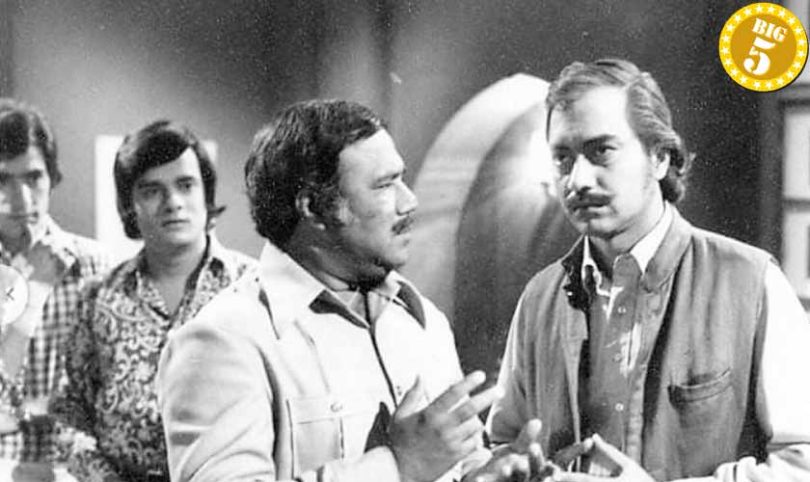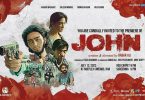Omair Alavi|Instep|June 6, 2021
Here’s looking at five works of literature that should be adapted to the small screen.
Khuda Ki Basti was an adaptation of Shaukat Siddiqui’s classic novel of the same name and was directed by Bakhtiar Ahmed.
We’ve said it before and must bring attention to it again: adapting the literary word for the small screen is an idea worth investing in. With Khadija Mastoor’s Aangan (2019), Umera Ahmed’s Alif (2020), and Rahat Jabeen’s Safar Tamam Hua (2021) making inroads into the audience’s minds, viewers are now searching for classics that were translated from books to TV. With that in mind, here are five of the best quality TV adaptations. Read on:
Khuda Ki Basti
(PTV, 1969, 1974)
Novel: Shaukat Siddiqui
Dramatization: Shaukat Siddiqui
Director: Bakhtiar Ahmed
Cast: Zaheen Tahira, Zahoor Ahmed, Mahmood Ali, Qazi Wajid, Subhani Ba Yunus, Raju Jamil, Saqib Sheikh, Behroz Sabzwari
How many TV dramas do you know of that were produced twice for the audience, garnering the same respect, the same love, and the same suspense each time? Khuda Ki Basti came at a time when Pakistani Television opted for adapted plays rather than original scripts. This series was developed by a team of intellectuals that featured novelist Shaukat Siddiqui (who wrote the novel) and his respected colleagues Faiz Ahmed Faiz and Jamiluddin Aali. When it aired for the first time in 1969, it was a rage, loved by all. The performances helped Pakistan Television become a force to reckon with in the region, and it held the top position till the 1990s. During the drama’s original airing, the-then former Foreign Minister of Pakistan, Zulfiqar Ali Bhutto, became a fan and when he became the Prime Minister – after the creation of Bangladesh – he asked the PTV management to telecast the drama again, which wasn’t possible as most of the tapes on which the play was recorded were either destroyed or re-used. Hence, the PTV management came up with a solution where all the actors were recalled, the drama was reproduced on the same lines, and this time it was preserved. So well that the audience still invests in watching it whenever it is aired.
Shama (PTV, 1976)
Novel: AR Khatoon
Dramatization: Fatima Surayya Bajiya
Director: Qasim Jalali
Cast: Begum Khursheed Mirza, Ghazala Kaifee (nee Najam), Javed Sheikh, Anwar Iqbal, Ishrat Hashmi, Rizwan Wasti, Parveen Akbar, Akbar Subhani, Zahoor Ahmed, Mohammed Yousuf, Zaheen Tahira
In the 1970s, television was considered as big as films, because while TV’s star was on the rise, the standard of films was going down. Fatima Surayya Bajiya knew exactly what the audience wanted – both the cinegoers and the TV lovers – and gave them exactly the kind of drama that was missing on the screens. A great cast and a strong narrative. Shot in Black and White, Shama went onto influence both films and TV in Pakistan, and across the border and you can see many similarities in projects that followed in either country. A lot of actors who were part of the play are now TV veterans. However, Ghazala Kaifee and Javed Sheikh look like they haven’t aged at all. The latter does resemble his son Shehzad who is currently doing a great job in Phaans while Ghazala Kaifee seems to have opted for grace over the years. A R Khatoon’s novel is still doing well but the drama helped the audience in visualizing the characters, their mannerisms, and their interactions well.
Sunehray Din (PTV, 1991)

Before directing several feature films, Shoaib Mansoor worked in music as well as television and adapted Sunehray Din that ran on PTV in 1991.
Inspired from: Kakuliyat by Lt Col Saulat Mirza, Gentleman Bismillah by Colonel Ashfaq Hussain & Gentleman Alhumdulillah by Lt Col Ashfaq Hussain
Adapted by: Shoaib Mansoor
Cast: Saleem Sheikh, Kiran, Aliya Kazmi, Azra Mansoor, Mumtaz Musharaf, Musharaf Ali Khan, Faraz Inam, Capt Qasim, Hameed Wyne
Directors: Mohsin Ali & Shoaib Mansoor
Let us not forget Shoaib Mansoor’s classic military drama, Sunehray Din which was an adaptation of not one but three books. Without Brigadier Saulat Mirza’s literary classic Kakuliyat and Colonel Ashfaq Hussain’s Gentleman Bismillah and Gentleman Alhamdulillah, Sunehray Din wouldn’t have been possible because the writer took inspiration from these books. Written in the 1970s and the 1980s, these three books (along with Colonel Mohammad Khan’s four books) make you want to enter the army and have fun, like the writers.
Everything from applying to the Armed Forces, to going for the ISSB, entering Pakistan Military Academy in Kakul and later living the life of a ‘gentleman’, these books revolve around the everyday life of a soldier. How well Shoaib Mansoor combined all these books, and then co-directed the play with his friend Mohsin Ali! The credit also goes to the actors Saleem Sheikh, Faraz Inam, Kiran, Hameed Wyne, Sahibzada Musharaf Ali Khan, Mumtaz Musharaf, and others who performed brilliantly in the drama, making it memorable for all those who grew up in the 1980s and the 1990s.
Uroosa (PTV, 1994)
Novel: Zubeida Khatoon
Dramatization: Fatima Surayya Bajiya
Cast: Shakeel, Ghazala Kaifee, Ishrat Hashmi, Neelofar Abbasi, Sultana Siddiqui, Zaheen Tahira, Adnan Siddiqui, Mishi Khan, Mazhar Ali, Shama Junejo, Hanif Raja, Sultana Zafar, Sami Sani, Fahmeed Ahmed Khan
Director: Qasim Jalali
It wouldn’t be incorrect to say that before Humsafar, there was Uroosa that captivated the audience’s fascination with its magical debutants, the iconic pairing of veteran actors and a star cast in the 1990s. What made it loved by the audience was the fact that it was adapted beautifully by Fatima Surayya Bajiya who joined hands with her frequent collaborator Qasim Jalali, and delivered a drama that has stood tall even after every other drama revolved around the blueprint it set.
Not only did it feature the same Saas Bahu stuff that the audience loves today (the sisters were the main issue in that play), it gave us Mishi Khan and Adnan Siddiqui, who went onto becoming stars themselves.
Watching veteran actors Shakeel and Ghazala Kaifee together after Ana was a treat for the eyes, as was Mazhar Ali’s performance as the lost man, Neelofar Abbasi’s return to TV, and Ishrat Hashmi’s ability to make everyone hate herself was quite the riot. Don’t miss out on a very young Hanif Raja in an important role as well, who showed immense potential before quitting TV for the stage.
Humsafar (2011)
Novel: Farhat Ishtiaq
Dramatization: Farhat Ishtiaq
Cast: Fawad Khan, Mahira Khan, Naveen Waqar, Atiqa Odho, Behroz Sabzwari, Noor Hassan, Hina Khawaja Bayat, Saba Faisal
Director: Sarmad Khoosat
If Khuda Ki Basti helped Pakistani drama find its footing internationally, Humsafar took it a step further and made it popular in places where Urdu dramas were not followed. Farhat Ishtiaq wrote both the novel and the screenplay. A lot was changed to make Humsafar viewer-friendly and that’s what clicked with the audience. Also, the charismatic pairing of Mahira and Fawad Khan added intimacy to the drama that already had Atiqa Odho in a larger than life role, and introduced VJ Naveen Waqar as a promising actor.
Humsafar came at a time when TV dramas were revolving around similar subjects and pushed the envelope in terms of narratives. Even after ten years, the play is considered a classic and features in every list imaginable that revolves around good TV dramas. It helped Fawad Khan find his mojo, propelled Mahira Khan towards stardom, revived Atiqa Odho’s career, and made Farhat Ishtiaq a household name. One must also commend Sarmad Khoosat for it was his direction that captivated the audience like never before, and raised the bar so high that people still compare anything remotely successful with Humsafar, no matter what!







